new posts in all blogs
Viewing: Blog Posts Tagged with: cornell, Most Recent at Top [Help]
Results 1 - 11 of 11
How to use this Page
You are viewing the most recent posts tagged with the words: cornell in the JacketFlap blog reader. What is a tag? Think of a tag as a keyword or category label. Tags can both help you find posts on JacketFlap.com as well as provide an easy way for you to "remember" and classify posts for later recall. Try adding a tag yourself by clicking "Add a tag" below a post's header. Scroll down through the list of Recent Posts in the left column and click on a post title that sounds interesting. You can view all posts from a specific blog by clicking the Blog name in the right column, or you can click a 'More Posts from this Blog' link in any individual post.
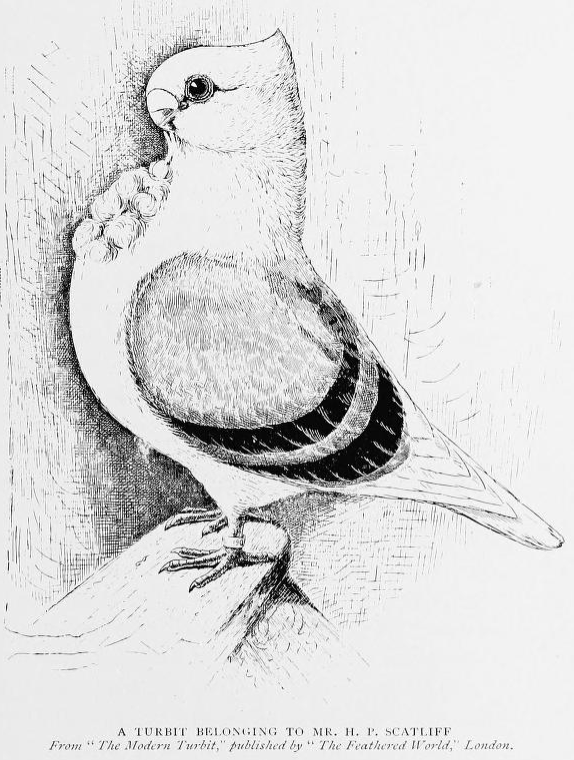
There has been a lot of great writing about copyright and access to our cultural and intellectual history in the weeks since Aaron Swartz’s death. I have been retreading some of my old favorite haunts to see if there was stuff I didn’t know about the status of access to online information especially in the public domain (pre-1923 in the US) era.
I talk like a broken record about how I think the best thing that libraries can do, academic libraries in particular, is to make sure that their public domain content is as freely accessible as possible. This is an affirmative decision that Cornell University made in 2009 and I think it was the right decision at the right time and that more libraries should do this. Some backstory on this.
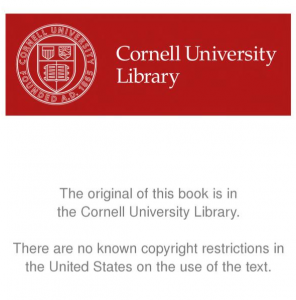 So, if I wanted to share an image from a book that Cornell has made available, I have to check the guidelines link above and then I can link to the image, you can go see it and then you can link to the image and do whatever you want with it, including sell it. This is public domain. The time and money that went into making a digital copy of this image have been borne by the Internet Archive and Cornell University. The rights page on the item itself (which I can download in a variety of formats) is clear and easy to understand.
So, if I wanted to share an image from a book that Cornell has made available, I have to check the guidelines link above and then I can link to the image, you can go see it and then you can link to the image and do whatever you want with it, including sell it. This is public domain. The time and money that went into making a digital copy of this image have been borne by the Internet Archive and Cornell University. The rights page on the item itself (which I can download in a variety of formats) is clear and easy to understand.
Compare and contrast JSTOR. Now let me be clear, I am aware that JSTOR is a (non-profit) business and Cornell is a university and I am not saying that JSTOR should just make all of their public domain things free for everyone (though that would be nice), I am just outlining the differences as I see them in accessing content there. I had heard that there were a lot of journals on JSTOR that were freely available even to unaffiliated people like myself. I decided to go looking for them. I found two different programs, the Register and Read program (where registered users can access a certain number of JSTOR documents for free) and the Early Journal Content program. There’s no front door, that I saw, to the EJC program you have to search JSTOR first and then limit your search to “only content I can access” Not super-intuitive, but okay. And I’m not trying to be a pill, but doing a search on the about.jstor.org site for “public domain” gets you zero results though the same is true when searching for “early journal content” and also for “librarian.” Actually, I get the same results when I search their site for JSTOR. Something is broken, I have written them an email.
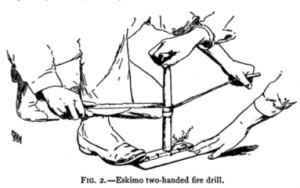 So I go to JSTOR and do a similar search, looking for only “content I can access” and pick up the first thing that’s pre-1923 which is an article about Aboriginal fire making from American Anthropologist in 1890. I click through and agree to the Terms of Service which is almost 9000 words long. Only the last 260 words really apply to EJC. Basically I’ve agreed to use it non-commercially (librarian.net accepts no advertising, I an in the clear) and not scrape their content with bots or other devices. I’ve also seemingly acquiesced to credit them and to use the stable URL, though that doesn’t let me deep-link to the page with the image on it, so I’ve crossed my fingers and deep-linked anyhow. I’m still not sure what I would do, contact JSTOR I guess, if I wanted to use this document in a for-profit project. Being curious, I poked around to see if I could find this public domain document elsewhere and sure enough, I could.
So I go to JSTOR and do a similar search, looking for only “content I can access” and pick up the first thing that’s pre-1923 which is an article about Aboriginal fire making from American Anthropologist in 1890. I click through and agree to the Terms of Service which is almost 9000 words long. Only the last 260 words really apply to EJC. Basically I’ve agreed to use it non-commercially (librarian.net accepts no advertising, I an in the clear) and not scrape their content with bots or other devices. I’ve also seemingly acquiesced to credit them and to use the stable URL, though that doesn’t let me deep-link to the page with the image on it, so I’ve crossed my fingers and deep-linked anyhow. I’m still not sure what I would do, contact JSTOR I guess, if I wanted to use this document in a for-profit project. Being curious, I poked around to see if I could find this public domain document elsewhere and sure enough, I could.
At that point, I quit looking. I found a copy that was free to use. This, however, meant that I had to be good at searching, quite persistent and not willing to take “Maybe” as an answer to “Can I use this content?” I know that when I was writing my book my publishers would not have taken maybe for an answer, they were not even that thrilled to take Wikimedia Commons’ public domain assertions.
As librarians, I feel we have to be prepared to find content that is freely usable for our patrons, not just content that is mostly freely usable or content where people are unlikely to come after you. As much as I’m personally okay being a test case for some sort of “Yeah I didn’t read all 9000 words on the JSTOR terms and conditions, please feel free to take me to jail” case, realistically that will not happen. Realistically the real threat of jail is scary and terrible and expensive. Realistically people bend and decide it’s not so bad because they think it’s the best they can do. I think we can probably do better than that.

By: Erica Olsen,
on 5/31/2011
Blog:
Librarian Avengers
(
Login to Add to MyJacketFlap)
JacketFlap tags:
Erica,
helplessness,
Life,
Avenging,
data,
archives,
Cornell,
metadata,
Wordpress,
Digital Library,
Ithaca,
librarian avengers,
Administrivia,
Add a tag
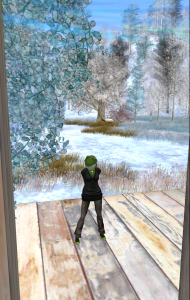 Recently I’ve been importing the ancient Librarian Avengers archives to live within WordPress. Because the site goes back to…hrm… 1997, there’s some data munging to do.
Recently I’ve been importing the ancient Librarian Avengers archives to live within WordPress. Because the site goes back to…hrm… 1997, there’s some data munging to do.
Right now I’m concerning myself with the period after Graduate School, when I moved to Ithaca, NY for an ostensibly-cool digital library fellowship. I couldn’t talk about how much I hated it at the time so the entries are mostly tangential to the work I was doing, but there’s still some fun stuff.
Importing ancient blog posts involves a bunch of tagging, titling, category-setting, and general modernization. I’ve been progressively making my way through the old posts, adding images, fixing spelling mistakes, and generally adding a bit of polish.
Part of the reason I’m taking on data scrubbing as my One Designated Personal Thing to Do this evening, is that today has been a study in helplessness. My daughter has a (small) fever. It’s the first time she’s been sick, and I’m trying to direct my need to control something (anything!) in a positive direction.
Also, cleaning data is pretty therapeutic after some of the body fluids I’ve encountered recently.
Related posts:
- Shh. “The Library” is the subject of the Freebase Data Mob I’m a librarian by ethnicity, if not profession these days,...
- Another Data Mob at Freebase – Ethnicity Wanna enrich some data? Got OCD? Tired of trying to...
- Freebase Hack Day II: The Return of Hack Day Librarian? Data junkie? Obsessive compulsive? Come to the Freebase hack...
Tom Bruce from Cornell’s Legal Information Institute talks about technologists being managed by non-technologists, and about the future of academic libraries in this thoughtful and amusing plenary talk.
In my experience, most of us don’t think about professions most of the time. We just get up and drag ass to work, whether we’re law teachers or opera singers or technologists or librarians or plumbers. We like to go to work if that is a place where our expertise is respected. And if we are not respected and we see ourselves as having little control over the very things for which we are held responsible, all of us get very, very unhappy. At the simplest level talk about professional models is nothing more and nothing less — on both sides — than displaced anxiety about where we stand in the workplace. Librarians have, for a long time, been able to draw some comfort and stability from trappings built up around the technology of print. That is going away. Technologists never had such a stable place to stand. And universities and law schools are particularly anxious workplaces now. So maybe we should spend less time debating professional models and concentrate on why it is that we need to talk about them so badly.
[thanks RepoRat]

By: Anastasia Goodstein,
on 3/16/2010
Blog:
Ypulse
(
Login to Add to MyJacketFlap)
JacketFlap tags:
pride and prejudice and zombies,
hercampus.com,
camel no. 9,
check yo nutz,
clean&clear,
ll bean,
welleseley,
cornell,
the office,
Ypulse Essentials,
aeropostale,
Add a tag
 Gender-neutral housing (a movement that started to accommodate GLBT students is beginning to gain wider acceptance with about 50 schools nationwide offering students the option. According to officials, most are platonic friends. Also Jezebel on a... Read the rest of this post
Gender-neutral housing (a movement that started to accommodate GLBT students is beginning to gain wider acceptance with about 50 schools nationwide offering students the option. According to officials, most are platonic friends. Also Jezebel on a... Read the rest of this post
An ongoing debate in the copyright wars is whether an institution that is making reproductions of public domain materials available should be allowed to dictate terms (usually involving payment) for use of those items. We all know that libraries need money. It’s also true that having digital copies of rare materials available helps preserve the original items. So, if I want to download a public domain book from Google Books — say John Cotton Dana’s book A Library Primer — I get usage guidelines from Google attached to the pdf I’ve downloaded.
Usage guidelines
Google is proud to partner with libraries to digitize public domain materials and make them widely accessible. Public domain books belong to the public and we are merely their custodians. Nevertheless, this work is expensive, so in order to keep providing this resource, we have taken steps to prevent abuse by commercial parties, including placing technical restrictions on automated querying.
We also ask that you:
+ Make non-commercial use of the files We designed Google Book Search for use by individuals, and we request that you use these files for personal, non-commercial purposes.
+ Refrain from automated querying Do not send automated queries of any sort to Google’s system: If you are conducting research on machine translation, optical character recognition or other areas where access to a large amount of text is helpful, please contact us. We encourage the use of public domain materials for these purposes and may be able to help.
+ Maintain attribution The Google “watermark” you see on each file is essential for informing people about this project and helping them find additional materials through Google Book Search. Please do not remove it.
+ Keep it legal Whatever your use, remember that you are responsible for ensuring that what you are doing is legal. Do not assume that just because we believe a book is in the public domain for users in the United States, that the work is also in the public domain for users in other countries. Whether a book is still in copyright varies from country to country, and we can’t offer guidance on whether any specific use of any specific book is allowed. Please do not assume that a book’s appearance in Google Book Search means it can be used in any manner anywhere in the world. Copyright infringement liability can be quite severe.
These are all “suggestions” as near as I can tell. As with the Chicken Coupon fiasco of a few days ago, the implied threat that comes along with this item puts a bit of a damper on the joy that is the public domain. Bleh. We’ve seen other big corporations and libraries doing this as well.
However, this post is mostly to say “Yay” about Cornell’s decision to remove all restrictions on the use of its public domain reproductions. Here’s their press release about it and here is the web page with the new policy. What’s their reasoning? Well among other thigns it’s hard to support a misson of open access and at the same time go out of your way to make materials more difficult to get ahold of and interact with. You can see some of Cornell’s 70,000 public domain items at the Internet Archive.
 was crawling through my archives this morning and came across this little rant that I wrote years ago, during my first, horrible, post-grad school job at the Cornell University Library. I know several of you Gentle Readers are in school right now, and I thought you might enjoy the sentiment:
was crawling through my archives this morning and came across this little rant that I wrote years ago, during my first, horrible, post-grad school job at the Cornell University Library. I know several of you Gentle Readers are in school right now, and I thought you might enjoy the sentiment:
First of all, and lets just get this out of the way: a full-time job is actually a pretty shoddy reward for 2.5 years of graduate school stress.
Yes, I’m grateful and all, glad to be here, nice to meet ya, etc. but frankly, I think I was looking for something along the lines of “congratulations on your degree, here’s your houseboat, now get out of here you scamp.”
I suppose having a stable schedule and slightly-more-realistic paychecks is reward enough, but lately I’ve had to face what seems to happen any time you put enormous effort into something. Which is, a rather slow transition into something different that requires enormous effort.
Like learning not to scream when someone suggests you attend the Metadata Working Group Meeting.

By: Rebecca,
on 10/12/2007
Blog:
OUPblog
(
Login to Add to MyJacketFlap)
JacketFlap tags:
people,
cornell,
A-Featured,
index,
newton,
jad22,
maud,
categories,
pages,
Add a tag
This Friday is particularly fantastic because this post is being brought to you by my handy post timer while I relax in the sun. I’m on vacation! Don’t worry though, I’ll be back on Monday. I can’t stay away from the computer for too long or I go into withdrawal (it is an ugly scene trust me). In the meantime here are some links to keep you busy.
Do you keep a close eye on your Pulitzer?
Test your literary knowledge (via Maud Newton).
Read about Soleil’s visit. (more…)
Share This
 riving home through rural Ithaca I saw, within 30 seconds:
riving home through rural Ithaca I saw, within 30 seconds:
- A snapping turtle crossing the road, long prehistoric tail dragging behind her. The turtles are laying eggs this week wherever they can, including parking lots, trails, and ditches.
- A great blue heron
- A vole running across the road. Voles are apparently susceptible to some sort of brain parasite that makes them go nuts and do stuff like this. A few weeks ago, cow-orker Mary Winston and I watched one running in a small circle for five minutes. I finally caught him and put him under the dock so he wouldn’t get stepped on. It was all very Wrath of Kahn.
- Two horses and riders walking toward me in my lane. Can anyone tell me if that is standard horse-in-street protocol? Because it was hella surprising.
30 seconds. Ithaca.
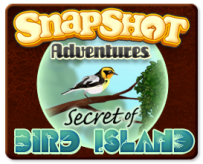 NYC game developers Large Animal Games have created a downloadable PC video game based on bird sounds and expertise provided by the Macaulay Library at Cornell’s Lab of Ornithology.
NYC game developers Large Animal Games have created a downloadable PC video game based on bird sounds and expertise provided by the Macaulay Library at Cornell’s Lab of Ornithology.
Which is where I work.
The game is called Snapshot Adventures. It was recently was acquired by Yahoo! games, which is a great for both the Lab and for environmental education, since part of the money it earns will directly fund our ecology work.
 You can play it for free here.
You can play it for free here.

By: Rebecca,
on 5/3/2007
Blog:
OUPblog
(
Login to Add to MyJacketFlap)
JacketFlap tags:
Law,
Politics,
Current Events,
cornell,
Media,
A-Featured,
regulation,
amendment,
regulated,
guns,
2nd,
Add a tag
Political reactions to the recent tragedy at Virginia Tech have been predictable. Leading Republicans invoke the 2nd amendment, or suggest arming students, while the Democratic  leadership scrambles for cover seeking to avoid the wrath of NRA. If we are to make any progress in formulating effective gun policies that will reduce America’s staggering levels of gun violence, we will need to move beyond the myths that obscure the true meaning of the Second Amendment, disinformation that clouds the history of gun regulation in America. (more…)
leadership scrambles for cover seeking to avoid the wrath of NRA. If we are to make any progress in formulating effective gun policies that will reduce America’s staggering levels of gun violence, we will need to move beyond the myths that obscure the true meaning of the Second Amendment, disinformation that clouds the history of gun regulation in America. (more…)
Share This
I tried out Cornell Library’s book-delivery service this week. A nice stack of David Foster Wallace books quickly appeared at my workplace yesterday afternoon, and I got a friendly call when they arrived.

 If you are a Cornell student or staff, you can have library books delivered to any library-location of your choice for free. For me, this means walking upstairs to our sunny little ornithology library overlooking the pond, and sitting by the fireplace for a bit.
If you are a Cornell student or staff, you can have library books delivered to any library-location of your choice for free. For me, this means walking upstairs to our sunny little ornithology library overlooking the pond, and sitting by the fireplace for a bit.
I’m an irredeemable Amazon.com addict, so I view as a right the ability to learn about a book, click a few links, and have said book delivered to me. Imagine my pleasure at being able to do this without paying for it.
 Unfortunately, you pretty much have to be told about the service to find out about it, unless you are the type of user who clicks links labeled “requests” on library websites and enjoy library jargon. Like many public services in the country, the crucial step of communicating to humans was overlooked.*
Unfortunately, you pretty much have to be told about the service to find out about it, unless you are the type of user who clicks links labeled “requests” on library websites and enjoy library jargon. Like many public services in the country, the crucial step of communicating to humans was overlooked.*
*Many nonprofits seem to say to their clients: “Look, we provide a valuable and benevolent service. You could at least be arsed enough to jump through a few design hurdles in order to discover our valuable service that you don’t know exists because of our design hurdles.”
I’m not sure, but I think the Cornell Library Patron narrative is supposed to go like this:
- A student or staff member goes into the library catalog and searches for some interesting books, thinking “Hey, I’ll go pick these up at the five separate library locations where they are housed”
- The patron adds each book to her “bookbag” (navigating a series of hurdles involving ID numbers, multiple passwords unique to the library system, and cute-not-descriptive service names) to create a list of books she wants to get.
-
 A MIRACLE OCCURS HERE
A MIRACLE OCCURS HERE
- The patron mysteriously knows that she can have her books delivered.
- The patron clicks into the catalog page for each book (students love catalog pages!) and separately clicks “requests” at the bottom of the page, knowing instinctively that book delivery is a “request”.
-
 The patron chooses “Book Delivery Services (9996 available)” from a dropdown list conveniently located below the fold.
The patron chooses “Book Delivery Services (9996 available)” from a dropdown list conveniently located below the fold.
- Assuming the patron does not receive the helpful error message “Your Patron Initiated Call Slip Request failed. This item is not available for Call Slip requests.” like I just did (Patrons Love Call Slip Requests!), she enters her ID number again.
- The patron is familiar with the names
 So, if I wanted to share an image from a book that Cornell has made available, I have to check the guidelines link above and then I can link to the image, you can go see it and then you can link to the image and do whatever you want with it, including sell it. This is public domain. The time and money that went into making a digital copy of this image have been borne by the Internet Archive and Cornell University. The rights page on the item itself (which I can download in a variety of formats) is clear and easy to understand.
So, if I wanted to share an image from a book that Cornell has made available, I have to check the guidelines link above and then I can link to the image, you can go see it and then you can link to the image and do whatever you want with it, including sell it. This is public domain. The time and money that went into making a digital copy of this image have been borne by the Internet Archive and Cornell University. The rights page on the item itself (which I can download in a variety of formats) is clear and easy to understand. So I go to JSTOR and do a similar search, looking for only “content I can access” and pick up the first thing that’s pre-1923 which is an article about Aboriginal fire making from American Anthropologist in 1890. I click through and agree to the Terms of Service which is almost 9000 words long. Only the last 260 words really apply to EJC. Basically I’ve agreed to use it non-commercially (librarian.net accepts no advertising, I an in the clear) and not scrape their content with bots or other devices. I’ve also seemingly acquiesced to credit them and to use the stable URL, though that doesn’t let me deep-link to the page with the image on it, so I’ve crossed my fingers and deep-linked anyhow. I’m still not sure what I would do, contact JSTOR I guess, if I wanted to use this document in a for-profit project. Being curious, I poked around to see if I could find this public domain document elsewhere and sure enough, I could.
So I go to JSTOR and do a similar search, looking for only “content I can access” and pick up the first thing that’s pre-1923 which is an article about Aboriginal fire making from American Anthropologist in 1890. I click through and agree to the Terms of Service which is almost 9000 words long. Only the last 260 words really apply to EJC. Basically I’ve agreed to use it non-commercially (librarian.net accepts no advertising, I an in the clear) and not scrape their content with bots or other devices. I’ve also seemingly acquiesced to credit them and to use the stable URL, though that doesn’t let me deep-link to the page with the image on it, so I’ve crossed my fingers and deep-linked anyhow. I’m still not sure what I would do, contact JSTOR I guess, if I wanted to use this document in a for-profit project. Being curious, I poked around to see if I could find this public domain document elsewhere and sure enough, I could.





 was crawling through my archives this morning and came across this little rant that I wrote years ago, during my first, horrible, post-grad school job at the Cornell University Library. I know several of you Gentle Readers are in school right now, and I thought you might enjoy the sentiment:
was crawling through my archives this morning and came across this little rant that I wrote years ago, during my first, horrible, post-grad school job at the Cornell University Library. I know several of you Gentle Readers are in school right now, and I thought you might enjoy the sentiment: riving home through rural Ithaca I saw, within 30 seconds:
riving home through rural Ithaca I saw, within 30 seconds:


 If you are a Cornell student or staff, you can have library books delivered to any library-location of your choice for free. For me, this means walking upstairs to our
If you are a Cornell student or staff, you can have library books delivered to any library-location of your choice for free. For me, this means walking upstairs to our  Unfortunately, you pretty much have to be told about the service to
Unfortunately, you pretty much have to be told about the service to 
 The patron chooses “Book Delivery Services (9996 available)” from a dropdown list conveniently located
The patron chooses “Book Delivery Services (9996 available)” from a dropdown list conveniently located
Hi Jessamyn. I’m so glad you’re a broken record on this issue. I am too, and still feel that the message still hasn’t been repeated often enough.
For my longest piece on this topic, see “Open access for digitization projects,” first published in my newsletter for July 2, 2009 [ http://goo.gl/NPQF ], and reprinted with some revisions in Karl Grandin (ed.), _Going Digital: Evolutionary and Revolutionary Aspects of Digitization_, Nobel Foundation, Royal Swedish Academy of Sciences, April 2011 [ http://goo.gl/bVnSl ].
I’m currently co-convening the National and State Libraries of Australasia (NSLA) Copyright Working Group and read this article with great interest. NSLA has made a commitment to ensure that “public domain works are, to the greatest extent possible, accessible and available for unrestricted re-use by the public.” At the moment we are considering how to make this an easy process, so we are looking at options to: standardise the way we identify our public domain collections in a way that is easy to understand and eliminates complex registration or permission barriers while still maintaining appropriate acknowledgments (for creators and library collections). Here’s the NSLA Position Statement on Public Domain – http://www.nsla.org.au/sites/default/files/publications/NSLA.Public_Domain_Statement.pdf Janice van de Velde